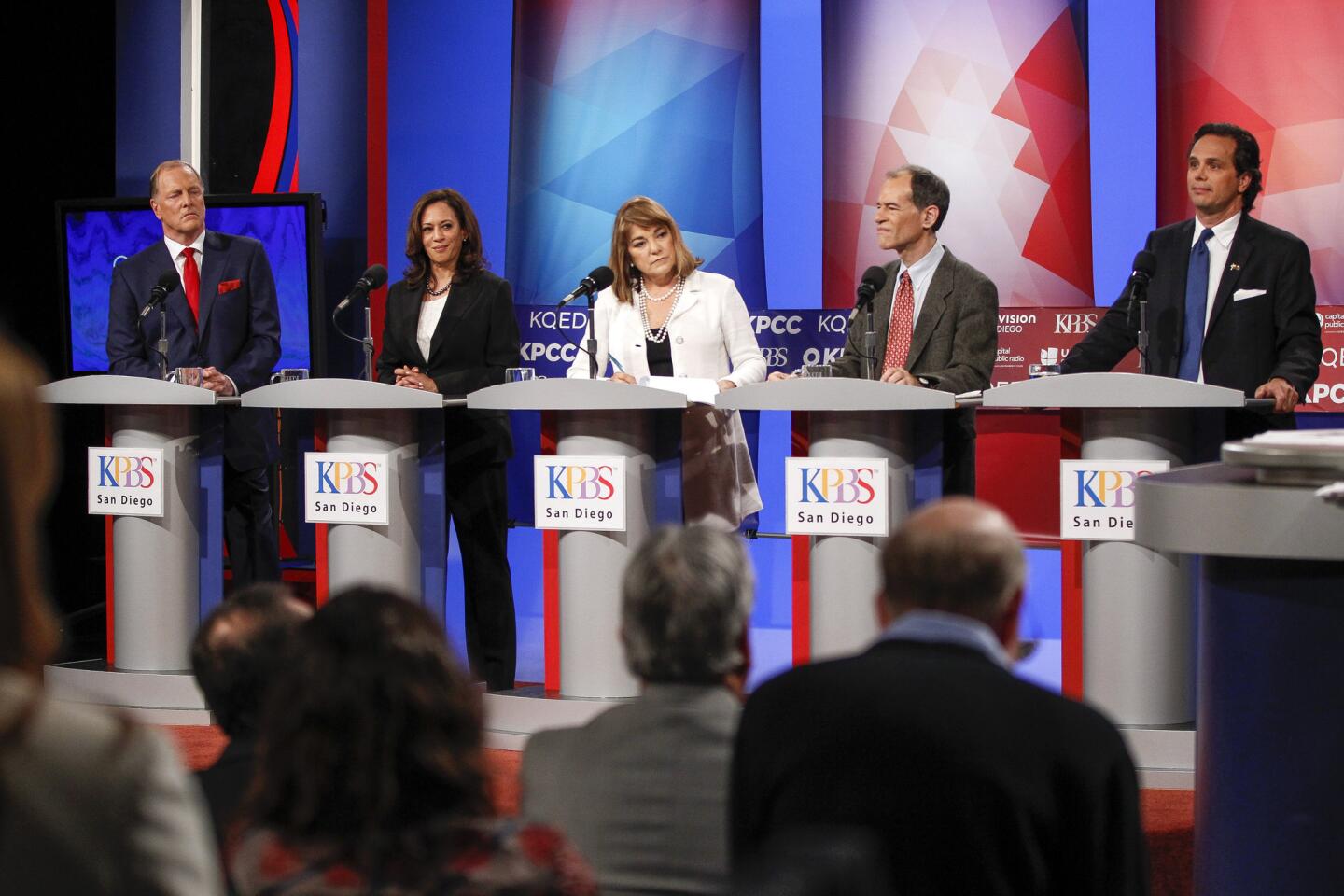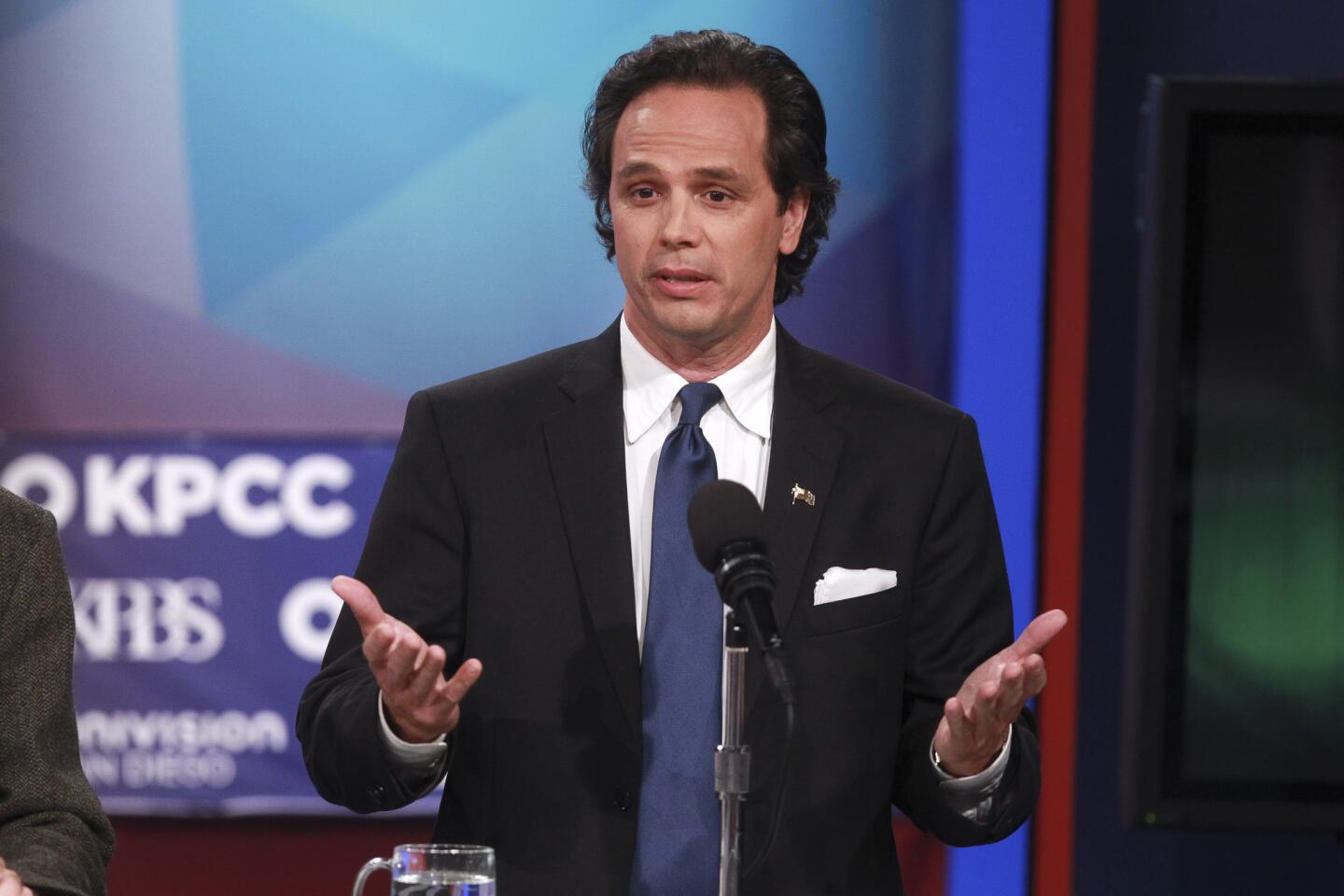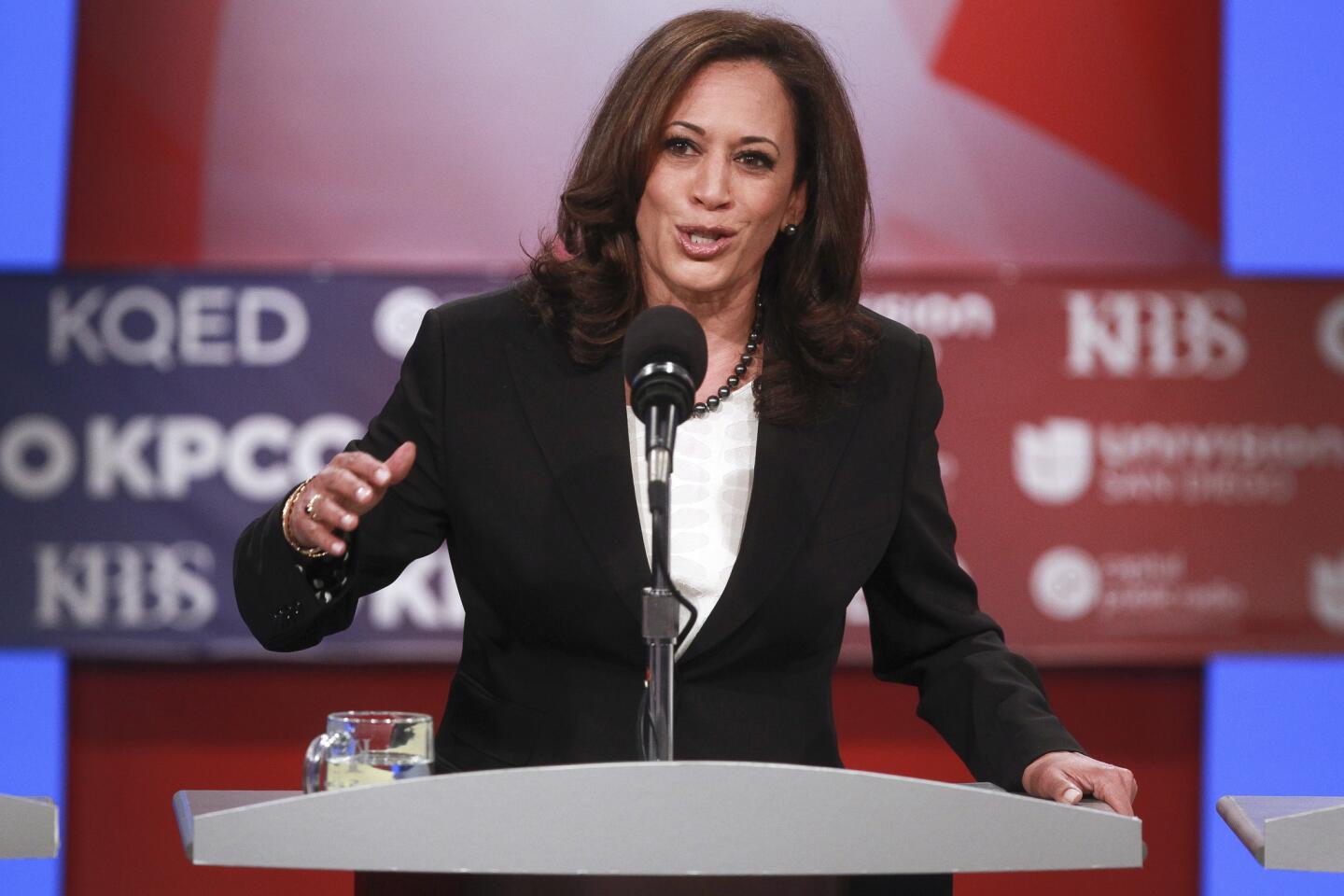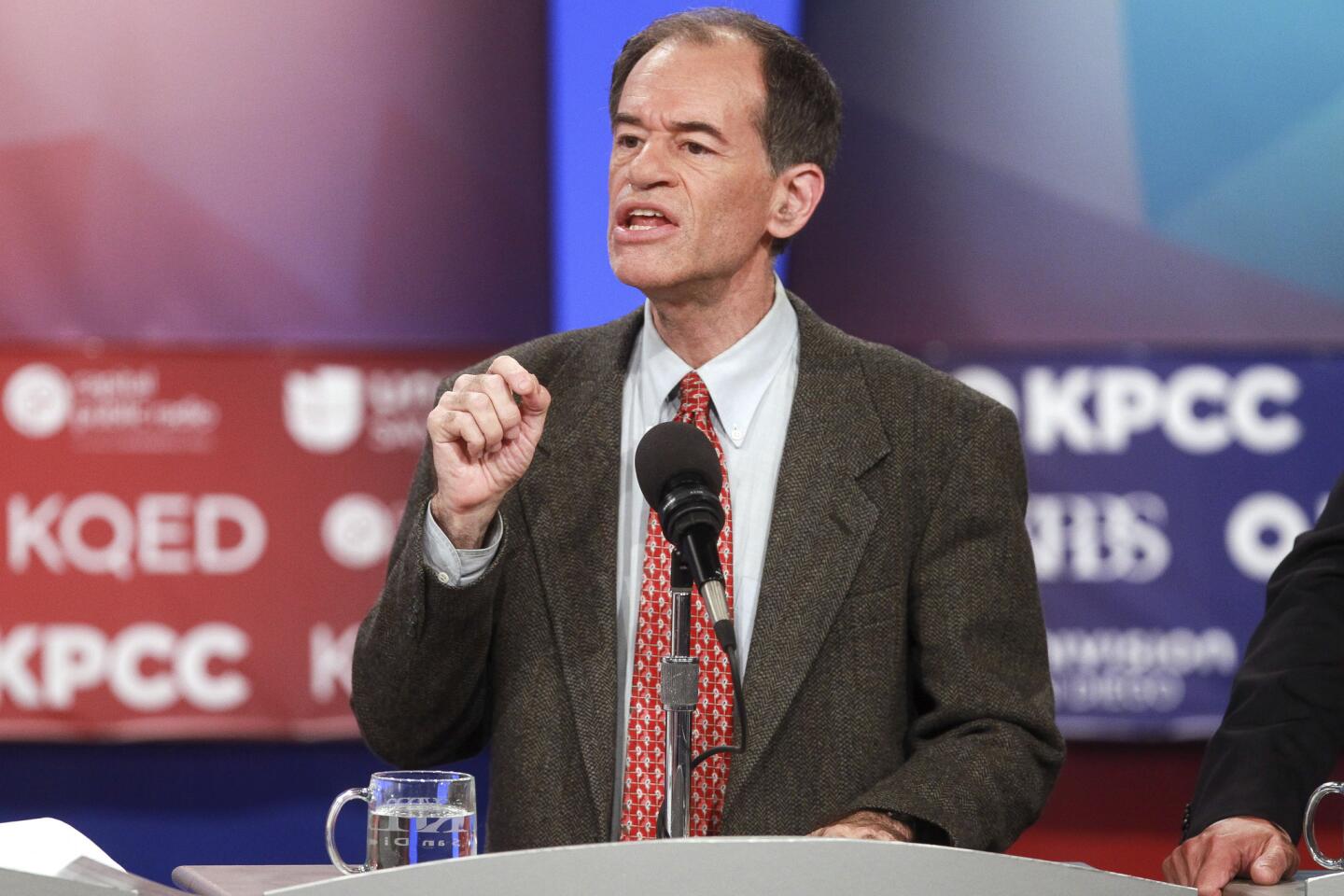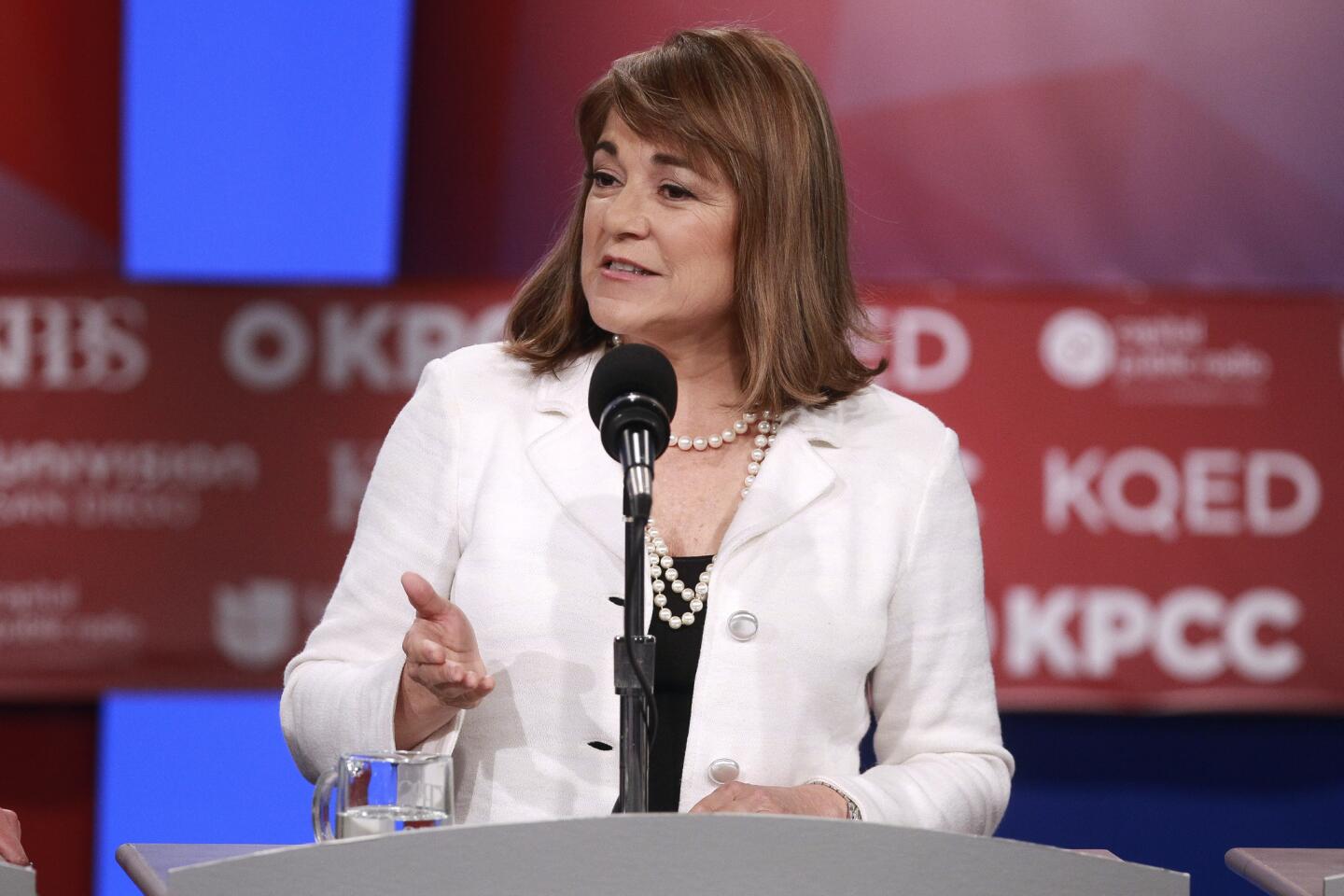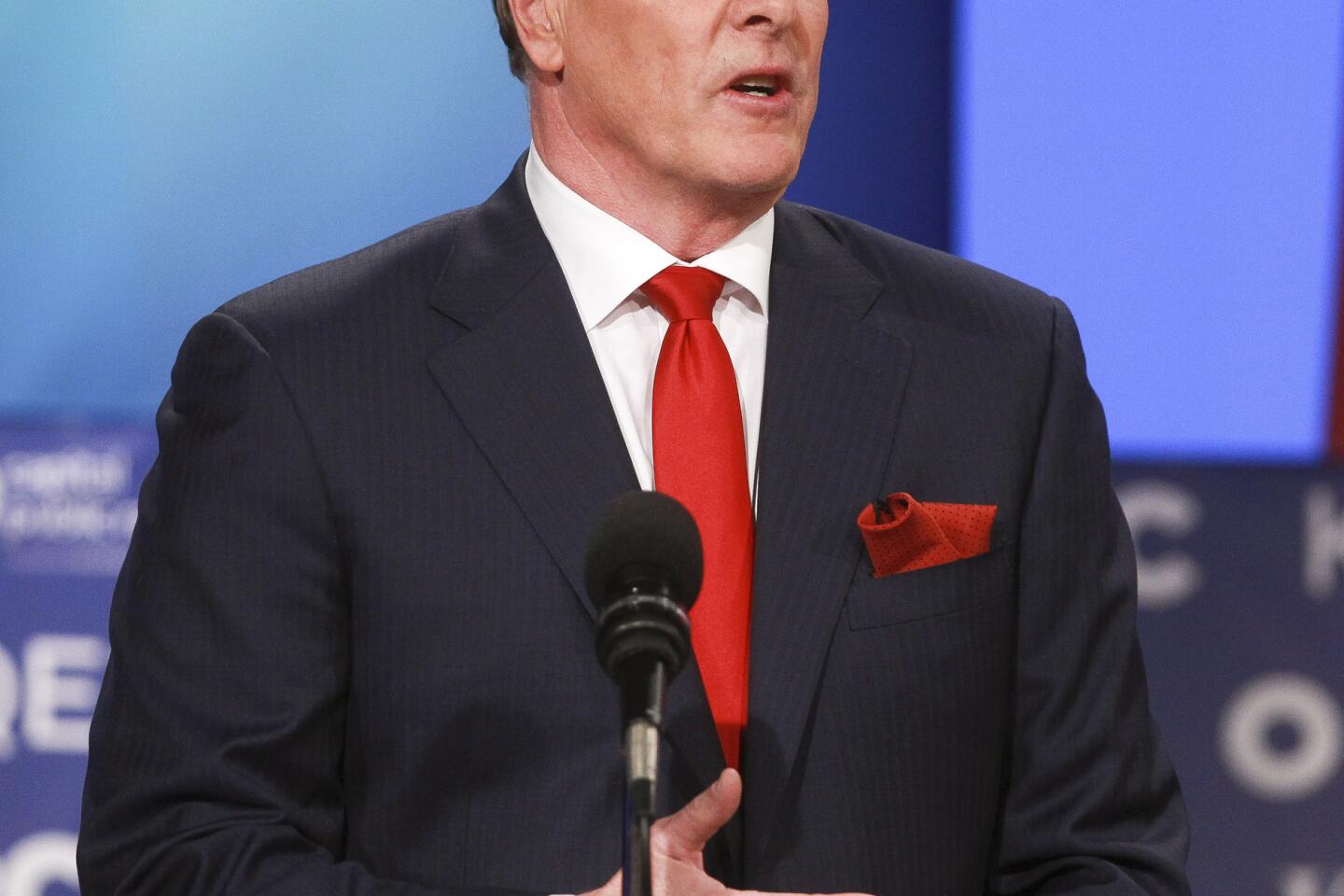Kamala Harris is focus of California’s final U.S. Senate debate before primary
Reporting from San Diego — U.S. Senate hopeful Kamala Harris found herself under attack Tuesday night during a fiery debate where she was accused of putting her political ambitions ahead of serving Californians as state Attorney General and pressed about why she hasn’t investigated police shootings.
Harris was put on defense almost immediately when former state Republican Party Chairman George “Duf” Sundheim, in his opening statement, accused her of siding “with her donors” over the state’s most vulnerable.
“Kamala is failing to keep us safe,” Sundheim said. “There is a 34% increase in violent crime in the state of California and a 24% increase in property crime, and that’s just within the last year.”
Harris initially appeared taken aback by Sundheim’s aggressive attacks, which continued throughout the hour-long debate.
She sharply defended her record and deflected the attacks by reciting her accomplishments as attorney general, saying she had been successful in going after the big banks that caused the mortgage crisis, protecting women’s reproductive rights and the rights of unaccompanied immigrant children.
“In the name of the people I have been proud to fight for California homeowners and bring $20 billion back to California,” Harris said at the outset. “I have been proud to fight on behalf of the people of California in fighting transnational criminal organizations.”
Tuesday’s debate was quite a change from the first debate in late April when Harris, the clear front-runner in the race to replace retiring Democrat Barbara Boxer in the Senate, emerged relatively unscathed after spending 90 minutes on stage with her top four Democratic and Republican political rivals.
The sharper tone this time around showed how much is at stake in the last of only two debates being held before California’s June 7 primary election, and underscored the intense competition for second place. Under the state’s top-two primary system, the two candidates who receive the most votes advance to the November general election, regardless of party. There are 34 candidates on the ballot.
An April Field poll had Harris receiving support from 27% of likely primary voters in California, compared with 14% for her top Democratic rival, Rep. Loretta Sanchez of Orange. The three top GOP candidates registered in the single digits: Ron Unz with 5%, Tom Del Beccaro with 4% and Sundheim with 2%. Close to half of those voters surveyed said they were undecided.
Sanchez, whose grasp on the second spot appears tenuous, at times appeared flustered during the debate.
When asked about her 2005 vote in favor of legislation that shielded the gun industry from liability for the criminal or negligent acts of gun owners, she gave a winding answer that ended with her saying her “F” rating from the National Rifle Assn. was proof of a strong record on gun control.
“My record is strong on protecting Americans with respect to gun violence,” she said. The law, she added, “didn’t give blanket immunity to the gun makers.”
Sundheim, who said gun control is best handled by the states, seized on the gun issue to launch another attack on Harris, citing a state auditor’s report that criticized her agency for delays in determining whether potentially dangerous people -- those with a severe mental illness or criminal history -- own guns in violation of state law.
Harris rejected the criticism, saying state officials have rounded up 10,000 guns. She said the program was “revived” under her leadership.
“Let’s not play around with real human lives,” she said.
Debate moderator Scott Shafer of the Bay Area public radio station KQED pointedly asked Harris about the criticism she received from the California’s Legislative Black Caucus for not launching independent investigations into fatal police shootings.
“That is in fact not accurate,” Harris retorted. She said her office has been aiding federal investigators and other law enforcement agencies investigating these cases. Still, the attorney general has not launched any civil rights investigations into police shootings in California since she took office in 2011. Her predecessors Jerry Brown and Bill Lockyear did.
The debate, broadcast on public television and radio stations across the state from the campus of San Diego State University, provided the candidates with their last major chance to address voters across California in a Senate race that has languished in the shadow of a presidential race that was rich in political theatrics and fireworks.
Unz, who championed the successful 1998 ballot initiative restricting bilingual education in public schools, tried to appeal to voters seeking an “anti-establishment” politician similar to White House hopefuls who have attracted attention this year.
“If you’re a Donald Trump supporter, if you’re a Bernie Sanders supporter … I’m the candidate to look at,” Unz said. “I’m an independent-minded Republican.”
Unz showed his eclectic political bent by providing two of the most stark comments of the evening. In one instance, the GOP entrepreneur called for a 50% decrease in immigrants allowed into the U.S. In another, he dismissed the broad scientific consensus on climate change.
“I’m a scientist and I know what I know and what I don’t know,” said Unz. “I’m not persuaded that the evidence is there.”
As he did in the first debate, Republican Tom Del Beccaro staked the mantle as the true conservative in the race. The strategy may help him on June 7 in the primary but may cost him in the November election in a state where Democrats hold a 15% edge over Republicans in voter registration.
Along with reciting the benefits for a federal “flat tax” and defending gun rights as enshrined in the Constitution, he labeled the nation’s immigration debate a “national security issue.” Del Beccaro has called for a crackdown on immigrants who overstay visas.
“We need to think about safety for all Americans,” he said. “We need to stop the racial tinge.”
No matter the topic or question, Harris seemed to be on the defensive throughout the evening.
A key moment came late in the debate when moderator, KPBS investigative reporter Amita Sharma, asked why the attorney general approved a decision to allow spent nuclear waste from the now-closed San Onofre Nuclear Power Plant to be buried near a seawall and the shoreline.
Harris hedged, saying that because her office represents the California Coastal Commission and there is ongoing legal action, she could not comment. Sharma continued to press, saying she was asking about something separate to that case.
“I have a client, I am the lawyer for the state,” said Harris. “I cannot talk about that.”
“She refuses to answer it,” Sundheim shot back.
Sanchez took one subtle swipe at the front-runner when it came to supporting a $15 an hour minimum wage.
Sanchez suggested others were newcomers to the issue, and that she was “not putting my finger in the wind to see where people are.”
ALSO:
Decker analysis: Five California candidates in one hour makes for an unsatisfying U.S. Senate debate
Full coverage of Senate debate
Harris in driver’s seat at California’s first U.S. Senate debate
32% undecided on Senate race in USC Dornsife/Los Angeles Times poll
There are 34 people running for Senate. Here they are in all their glory.
Picking a candidate like ‘throwing darts at a dart board’
Times Staff Writers Christine Mai-Duc and Chris Megerian contributed to this report.
More to Read
Get the L.A. Times Politics newsletter
Deeply reported insights into legislation, politics and policy from Sacramento, Washington and beyond. In your inbox three times per week.
You may occasionally receive promotional content from the Los Angeles Times.
